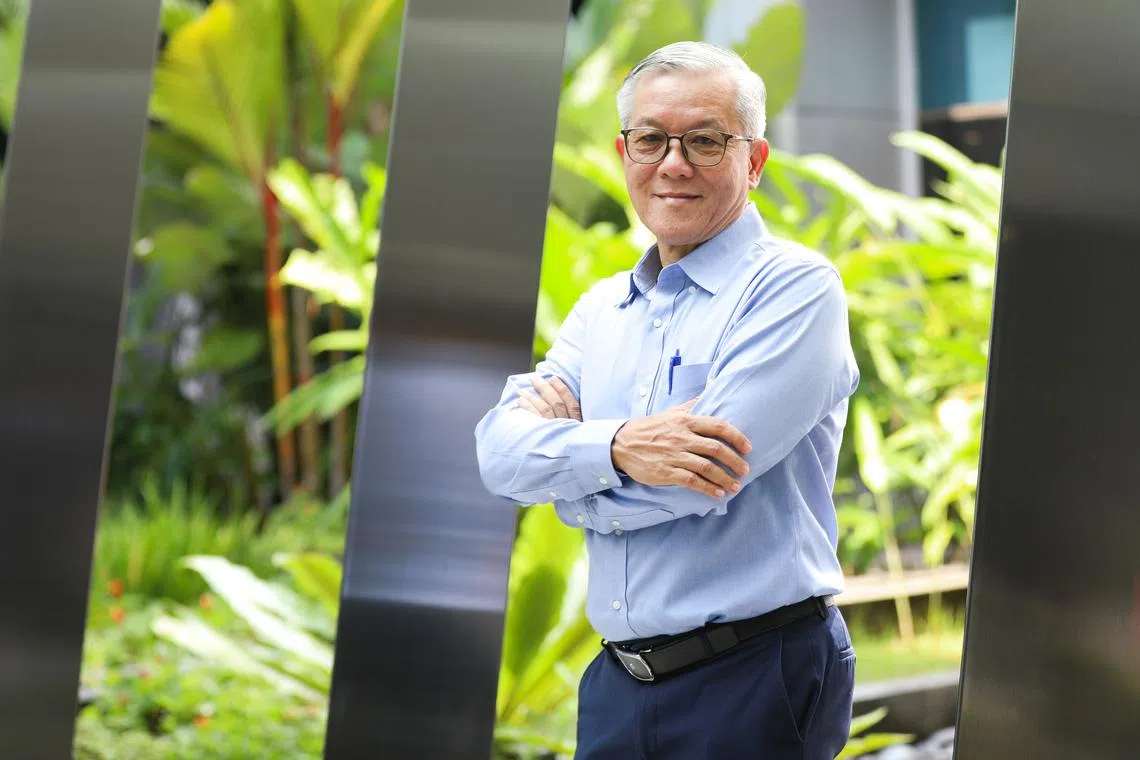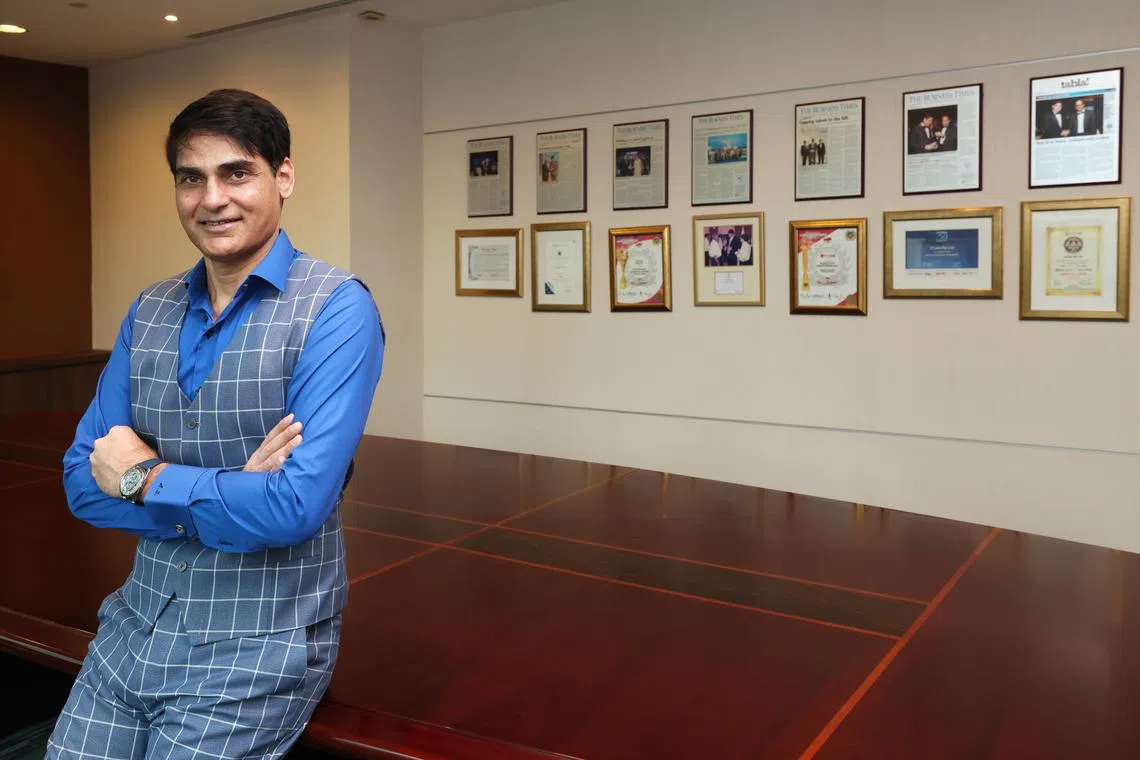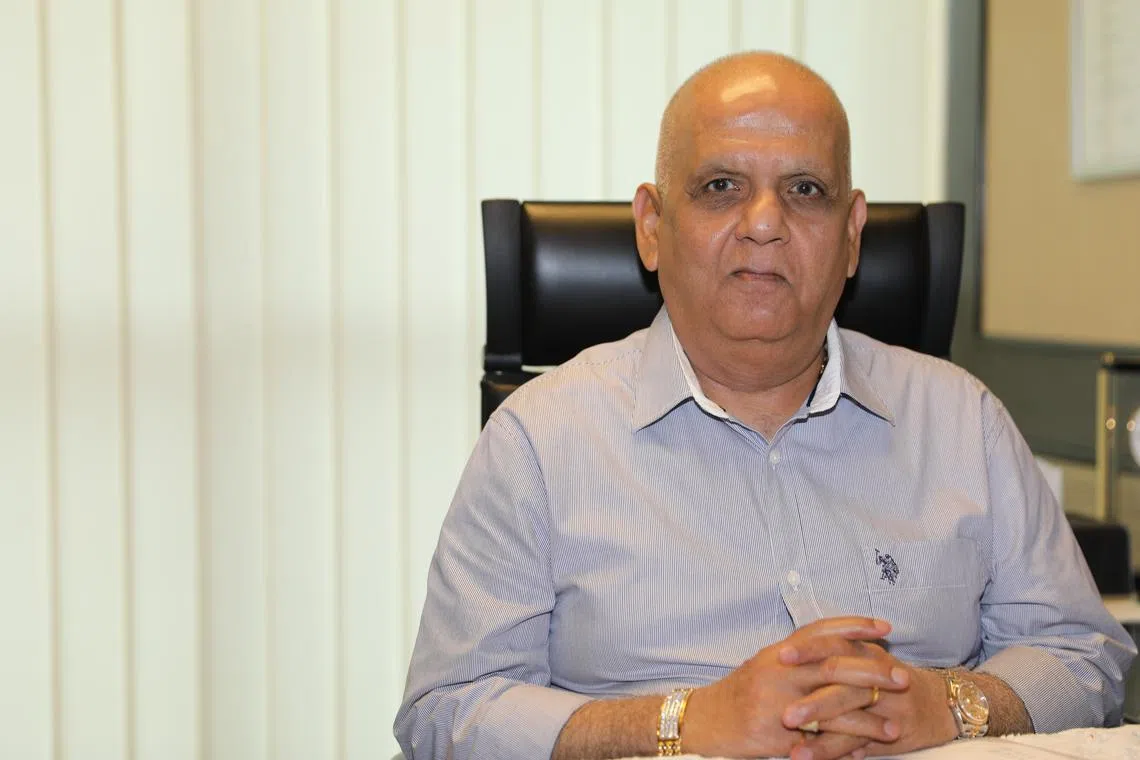Forging lasting legacies: Multi-year E50 winners share their formula for long-term success
The leaders of Almarc Engineering, ITCAN and Khaitan International discuss how to build resilient businesses

EACH year, droves of companies apply to participate in the Enterprise 50 Awards, in the hope of receiving what are possibly the most prestigious awards currently available for small and medium-sized enterprises in Singapore.
Winning once is a worthy achievement. Reaching this milestone multiple times is harder still.
Piping manufacturer Almarc Engineering and commodities trader Khaitan International have each won the award five times, while IT services provider ITCAN celebrates its 10th win this year.
The Business Times speaks to the leaders of these companies about how they have built their legacies – and how the next generation of business leaders can do the same.
ROUNDTABLE PANELLISTS
- Alvin Cher, managing director, Almarc Engineering
- Amit Sujan, president and chief executive officer, ITCAN
- Pawan Khaitan, chairman, Khaitan International
Moderator: Renald Yeo, journalist, The Business Times
Navigate Asia in
a new global order
Get the insights delivered to your inbox.
Looking back, what are you most proud of in your company’s legacy?
Amit Sujan: I am proud that we have maintained good relations with all our clients. Most of our clients have been with us for more than 10 years, and the majority of our revenue is derived from long-term clients.
We do not have a situation where, every now and then, clients leave, and we have to look for new clients.
Pawan Khaitan: Long-term, dependable relationships have been a key driver of our success. To maintain this, we do not take any shortcuts, and also ensure that in every transaction, and in every interaction, people come to rely on us as a partner.
SEE ALSO
This has translated to exclusive arrangements. For example, in some African countries, our in-country partners deal exclusively with us, through agreements dating back years.
We have achieved this by going beyond the typical buyer-seller relationship, such as by financing some machinery if they need it. Sometimes, we also commit to saying: “Okay, we will buy your whole stock of commodities.” This means that they do not have to spend additional time finding new customers.
Alvin Cher: It is our employee-centric mindset. I am most proud of the fact that we managed to go through the Covid-19 pandemic without having to let go of a single employee. In fact, we did not even have to resort to any pay cuts during this period.
We achieved this through a combination of internal resources and tapping relevant government grants, such as the Jobs Support Scheme.
The pandemic was a challenge because we had to shut down our operations for a period of time, due to movement restrictions. But we managed to go back to work, after one of our major pharmaceutical clients wrote to the government on our behalf.

What key decisions or moments have shaped the success of your business?
Cher: The story of Almarc is one of circumstance. Prior to Almarc, I was running another company as a joint venture with a partner, and we ran that for 17 years. The partnership eventually broke down; we had to shut down the company.
Right after, in 2015, I decided to set up Almarc to continue to support our customers, as well as to provide employment to all my staff.
Thankfully, most of the customers we worked with continued to work with Almarc, and about 70 per cent of the former staff joined us too.
Khaitan: We are committed to embracing change, whether it is through evolving in line with market conditions, or adapting our operations to meet our customers’ needs.
Thirty years ago, we were dealing a lot with polymers, especially in India. That was the demand at that given point in time. But over time, the government policies changed, new players entered the market, and the demand for polymers began dying out.
So we explored new markets and new commodities. Today, we deal with traders in more than 90 countries, and we had to build this network over a long period of time.
Sujan: About 14 years back, we initiated a project to put some of our project-management functions onto a cloud-based platform. By doing so, everyone in the organisation gained access to the information – which was harder to achieve with the paper-based system used previously – and we became more productive.
This software, developed entirely in-house and used by only us, aids in tracking what project each employee is working on. It allows the management to decide more easily when employees can be deployed to another project.
We started on this before cloud-based platforms were popular, and it definitely helped with productivity.
How do you ensure your company’s values and legacy are upheld as you grow?
Khaitan: As Khaitan International continues to grow and as we enter new markets, we must maintain trust with customers, and the quality and reliability of our operations.
This means that in some cases, we might not want to work with partners whose values do not align with ours. Some people are here for short-term gain. For example, someone might say: “Oh, I will give you a higher price if you give me my cargo first.” I would rather go with the person who will stay with us for the long term.
Sujan: Our biggest priority is our people. This also means constantly providing training and upskilling opportunities, so they can grow with the company.
For instance, our employees can freely choose to attend courses that are in line with their goals for personal growth, and we will reimburse all the costs. However, we reimburse exam costs – if there is such a component – only after they pass the exams.
Why? Funding the courses is something that we want to do, but we also want our people to be committed. This way, they prepare properly and thoroughly before making an attempt. In fact, we have seen the ratio of people failing certain exams trending down.
Cher: The customer always comes first. When a customer tells us that they need something, we are there with the goods required.
For some of our customers, every hour of production delay can cost up to a million dollars.
If there is any urgent need, even on public holidays, we are there to supply them. That is the commitment we give.

How does sustainability or corporate responsibility shape the future of your business?
Sujan: In the last four years, we have gone totally paperless. Every department is also encouraged to recycle its IT equipment, such as laptops.
We also have mentorship programmes for the community. Recently, we were among the sponsors of a hackathon called Mindful Hacks, for about 100 students from different universities.
At that hackathon, the youth had to come up with solutions to address challenges in the mental health space. Apart from sponsorship, we provided mentorship and guided the students on how they can improve on their projects.
Cher: Sustainability is extremely important for us. We actually hired our first sustainability manager six months ago. He is looking into our company’s processes, and finding ways to cut down our energy consumption.
This is already starting to bear fruit. Three months ago, we invested S$30,000 in a new air compressor, which consumes about 30 per cent less energy than the previous unit.
On Nov 30, we will also be planting 50 trees in Woodlands. We donated S$15,000 to the National Environment Agency to be able to do this.
Khaitan: In a way, we already contribute to sustainability in our existing business. We do a lot of metal-scrap recycling; in particular, we buy used, lead-based car batteries from aggregators in different countries, and then we ship those to India.
In India, the lead and plastic in these used batteries can be recycled to make new batteries. This way, we are helping to contribute to the circular economy.

What advice would you give to the next generation of entrepreneurs on building a lasting legacy?
Cher: Treating your employees well is very important – for example, reward them at the end of the year. Give them a good bonus, and they will stay.
For us, our attrition rate is very, very low. It is something like 2 per cent a year; we have about 50 employees. Hardly anybody leaves our company.
We pay them a reasonable salary, but a very good bonus. It is almost like profit-sharing; if the company does well, we will make sure that our staff gets a very good bonus.
This is so that everybody can be happy with their salary, and continue the good work they are doing.
Khaitan: Building a lasting legacy as an entrepreneur is done through creating positive impacts on society through your business.
You also have to stay true to your values, yet embrace adaptability. The business landscape is constantly changing, and by being flexible, you can adapt to new technologies. Do not be complacent.
Sujan: You should have clear-cut ethical policies in place. For instance, we are very against bribery, so we have clear demarcations on how our relationship is going to be with the clients.
Twice a year – during Diwali and Christmas – we send gifts to our clients, and the price range of those gifts do not exceed S$50. We also try to make sure that it is meant for the whole team, and not specifically to any individual.
Sometimes, when we present our gifts to our clients, it could be seen as, “Wow, this company is so stingy”. But we do not want to place emphasis on the gifts. We do not want our relationship to be about gifts, rather than our services and the contributions we can bring.
What challenges do you foresee for future business leaders, and how can these be overcome?
Cher: It is important to internationalise. We entered Indonesia one year ago; Thailand three years ago; and Malaysia six years ago.
You cannot concentrate on Singapore alone. The city-state still accounts for about 80 per cent of our turnover, but relying just on local operations is quite risky.
At the same time, you have to keep in mind that different countries have legal or business frameworks that are different from those at home.
In Thailand, for example, we had to enter through a joint venture with a local partner because they did not allow us to fully own the company. You have to get used to the policies, and slowly adapt to them.
Khaitan: You have to embrace technology and keep up with it. It can be artificial intelligence (AI), or automation, or something else. For us, we were one of the first in Singapore’s maritime sector to digitalise the sending of cargo documents.
In the past, multiple paper copies would have had to be sent to different parties – banks, customs offices and clients’ shipping departments – for endorsement. It took 20 to 25 days to do this.
By digitalising, it speeds up the process to about five days, which allows us to save on interest costs. That is because we receive the money for our goods more quickly from the clients.
Sujan: It is very critical for us to keep pace with the changes in technology. In the IT services sector, if we cannot stay ahead of the changes, we will be left behind.
We always encourage all our people to look out for new courses and to attend more courses. Right now, we are trying to get our people to attend more AI courses, and to not be fearful of AI, thinking that it will take away their jobs.
If you learn AI in the right way, you will be able to contribute to processes brought about by the new technology, and then you will be required more in this role – that is the whole philosophy.
Learn new things, and do not be scared of it. There will always be resistance to change, but you must overcome that.
Decoding Asia newsletter: your guide to navigating Asia in a new global order. Sign up here to get Decoding Asia newsletter. Delivered to your inbox. Free.
Copyright SPH Media. All rights reserved.









